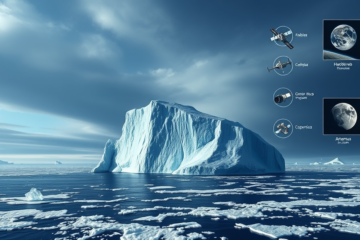Damage to Shark Teeth from Acidification
Tooth Damage are a growing concern as new studies reveal the impacts of ocean acidification on marine life.
This article explores recent research investigating how rising carbon emissions are affecting the teeth of sharks, particularly blacktip reef sharks.
Using a methodology that analyzes teeth at different pH levels, the results show visible damage that can compromise the feeding efficiency of these marine predators.
Furthermore, the research highlights the importance of shark teeth for the health of marine ecosystems and the consequences of acidification combined with other environmental stresses.
Impacts of Ocean Acidification on Shark Teeth
The increase in carbon emissions into the atmosphere, mainly due to human activities, has led to a growing ocean acidification This significant change in marine pH originates from the absorption of large amounts of carbon dioxide (CO₂) by the oceans, which gradually reduces the pH of the water taking it away from its natural condition Acidification has direct consequences for marine fauna, especially the teeth of blacktip reef sharks. see more here
As ocean acidity increases, the dental structure of these marine predators becomes more vulnerable. Teeth become susceptible to cracks and structural degradation, compromising its effectiveness in capturing and consuming prey This dental fragility leads to an increase in energy demands, as sharks need to make more efforts to feed themselves adequately full details here
Furthermore, these drastic changes not only interfere with survival of blacktip reef sharks but also threaten the health of marine ecosystems that depend on these predators to maintain ecological balance Combined with other environmental stresses, ocean acidification represents a crucial challenge for marine biodiversity understand the context
Study Methodology: pH Analysis and Shark Teeth
Researchers, concerned about the effects of ocean acidification on the future of sharks, undertook a detailed study to analyze the impacts of pH on the integrity of the teeth of these marine predators.
They collected 600 teeth of blacktip reef sharks and deliberately exposed them to different pH conditions, established to mimic future projections of acidification.
For the experiment, they used two main contexts: control water with pH 8.2, reflecting current ocean conditions, and a more acidic environment, with pH 7.3, predicted for the year 2300.
During tooth preparation, the specimens were thoroughly cleaned and grouped according to their exposure conditions.
This configuration aimed to provide a clear understanding of the potential structural damage that could occur due to increased acidity in the oceans.
| pH | Condition |
|---|---|
| 8,2 | Control |
| 7,3 | Experimental |
This approach, in addition to being enlightening, highlights the urgency of actions to mitigate the increase in carbon emissions, ensuring conservation the health of marine ecosystems.
Visible Damage and Impacts on Tooth Structure
The research highlights the significant structural damage suffered by the teeth of sharks exposed to ocean acidification conditions, specifically at a pH of 7.3. These teeth showed evident fissures, enamel loss and micro-cracks, seriously compromising its structural integrity.
Such modifications to the surface of the teeth can result in a significant reduction in its mechanical resistance, impairing the sharks' efficiency in capturing and chewing prey.
This requires greater energy expenditure, as eating becomes more laborious.
According to experts reported in Public, the observed structural degradation aligns with the adverse effects of ocean acidification caused by increased carbon emissions.
When coming into contact with more acidic water, teeth lose essential minerals, resulting in directly on its regeneration capacity.
Therefore, in addition to increasing their energy needs, sharks face a potential risk to their survival.
Added to this is the impact of global warming, which exacerbates these negative effects, as detailed in the This Is Money.
This situation highlights the urgency of mitigating carbon emissions and preserving the health of marine ecosystems.
Consequences for Shark Feeding and Metabolism
The loss of dental integrity in blacktip reef sharks, a result of ocean acidification, directly affects their ability to prey and survive.
Cracked and structurally degraded teeth compromise the effectiveness of prey capture, a crucial skill for your survival in a competitive ecosystem.
This condition results from changes in marine pH, as demonstrated in studies that simulated a future scenario with water pH 7.3, predicted for the year 2300. Since sharks' teeth are essential for gripping and tearing the flesh of their prey, any damage that weakens this function can have serious impacts on their diet and overall health.
In addition, a compromised dentition leads to a significant increase in energy needs, since sharks need to expend more energy to capture and process their prey.
This increased energy expenditure means sharks need to hunt more frequently, increasing the difficulty of finding sufficient food in environments already altered by other environmental stresses.
Thus, this combination of factors not only reduces the fitness of sharks to survive, but it also puts them in a state of increased vulnerability, compromising the balance of the marine ecosystem.
For details on related research, please refer to this study.
Limitations and Validation of Research Results
Reproducing real ocean conditions in a laboratory setting is a significant challenge that raises questions about the validity of experimental results.
Limitations inherent in ocean acidification experiments often complicate the translation of these findings into the natural environment.
The complexity of marine ecosystems, with their diverse biological and chemical interactions, is difficult to fully replicate, raising concerns about the accuracy of simulations.
Some of the main limitations include:
- Shortage of natural environmental variables
- Limited manipulation of complex ecological interactions
- Insufficient study periods to observe long-term effects
While laboratory experiments reveal essential details about how marine organisms like sharks respond to acidification, field evidence often corroborates these findings, reinforcing the impact of acidification.
Different complementary studies support the idea that damage to shark teeth caused by ocean acidification can have knock-on effects on marine ecosystems.
Thus, although there are limitations, the studies offer valuable insights that are aligned with the broader scientific literature on the subject.
Ecological Importance of Shark Teeth and Combined Environmental Stresses
Shark teeth play a crucial role in maintaining food chains in marine ecosystems.
As apex predators, they help regulate prey populations, maintaining the balance and health of marine habitats.
However, the degradation of shark teeth, as shown in recent studies, may have significant impacts on this balance.
With weakened teeth due to ocean acidification resulting from increased carbon emissions, sharks have difficulty feeding efficiently.
This not only interferes with their survival, but also affects the populations of other marine organisms.
The situation worsens when acidification combines with pollution and global warming.
Rising ocean temperatures accelerate the metabolism of marine organisms, increasing their need for nutrition, while chemical pollution introduces contaminants that can further weaken sharks' tooth structure.
The publication in CNN Brazil highlights how these combined factors can create an unsustainable environment for marine life, leading to a collapse of food chains.
Therefore, acidification combined with pollution and global warming aggravates ecological risks, seriously threatening biodiversity and requiring immediate action to mitigate the impacts.
In short, damage to shark teeth resulting from ocean acidification not only affects the health of the sharks themselves, but also has significant implications for marine ecosystems.
The research highlights the urgent need to mitigate carbon emissions and protect our oceans.



0 Comments